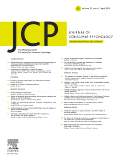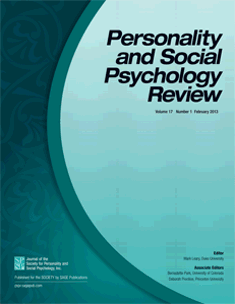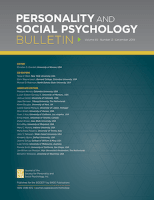
JOURNAL OF EXPERIMENTAL SOCIAL PSYCHOLOGY
Scope & Guideline
Bridging Theory and Practice in Social Psychology
Introduction
Aims and Scopes
- Social Identity and Intergroup Relations:
Research exploring how social identity influences group dynamics, prejudice, discrimination, and intergroup cooperation. This includes studies on identity threat, group bias, and the psychological mechanisms that drive intergroup conflict. - Moral Judgment and Ethical Decision-Making:
Investigations into how individuals make moral decisions, including the role of emotions, context, and social norms in shaping ethical judgments. This area also examines biases in moral reasoning and the influence of group identity on moral evaluations. - Gender and Diversity Issues:
Studies addressing gender roles, stereotypes, and the impact of diversity on social interactions. This includes research on gender-related biases in various contexts, such as the workplace, academic environments, and social media. - Social Influence and Communication:
Research focused on the processes of social influence, including how communication shapes perceptions, attitudes, and behaviors. This encompasses studies on gossip, persuasion, and the effects of social norms on decision-making. - Psychological Responses to Social Threats:
Exploration of how perceived social threats, such as discrimination, stigma, and social exclusion, affect psychological well-being and behavior. This area also investigates coping mechanisms and resilience in the face of social adversity.
Trending and Emerging
- Intersectionality and Identity:
There is a growing emphasis on intersectionality, exploring how overlapping identities (e.g., race, gender, socioeconomic status) influence social behavior and experiences. This trend is crucial for understanding the complexity of social dynamics in diverse populations. - Impact of Technology and Social Media:
Research examining the effects of technology, particularly social media, on social behavior, identity formation, and interpersonal relationships is on the rise. This includes studies on online interactions, cyberbullying, and the psychological effects of digital communication. - Environmental and Social Justice:
Emerging themes focus on social psychology's role in addressing environmental issues and social justice. This includes research on collective action, activism, and how social psychological principles can inform policies aimed at promoting equity and sustainability. - Psychological Responses to Global Events:
Recent studies are increasingly addressing how global events (e.g., pandemics, political unrest) shape social behavior and psychological responses. This trend reflects a broader interest in the impact of societal crises on individual and collective psychology. - Misinformation and Conspiracy Theories:
Research on the psychological underpinnings of misinformation, conspiracy theories, and their social consequences has gained prominence. This includes examining why individuals are drawn to conspiratorial thinking and how misinformation spreads in social networks.
Declining or Waning
- Traditional Stereotyping Research:
There seems to be a decline in studies focused purely on traditional stereotypes without considering intersectionality or contextual factors. As researchers increasingly emphasize nuanced understandings of identity, simpler models of stereotyping are becoming less prevalent. - Experimental Studies on Conformity:
Research specifically targeting conformity behaviors, particularly in controlled experimental settings, appears to be waning. This may be due to a broader interest in complex social dynamics over straightforward conformity effects. - Individual Differences in Personality Traits:
There is a noticeable decrease in the focus on individual personality traits as predictors of social behavior. Researchers are shifting towards examining situational influences and contextual factors rather than relying solely on stable personality characteristics.
Similar Journals

JOURNAL OF SOCIAL PSYCHOLOGY
Empowering scholars to shape the future of social psychology.JOURNAL OF SOCIAL PSYCHOLOGY, established in 1930 and published by ROUTLEDGE JOURNALS, TAYLOR & FRANCIS LTD, is a revered platform in the field of social psychology, distinguished for its commitment to advancing the understanding of individual and group behavior. With an impressive Q2 ranking in the 2023 category for Social Psychology and a notable 67th percentile position in Scopus rankings, this journal serves as a critical resource for researchers, professionals, and students seeking to explore the latest empirical research, theoretical advancements, and application in social psychology. Although it does not provide open access options, the journal ensures high visibility and rigorous peer review processes, making it a trusted source for high-quality scholarly articles. As it converges its publication from 1930 to 2024, it continues to be at the forefront of scholarly dialogue, shaping the discipline's future.

Social Psychology and Society
Advancing Knowledge on Social Dynamics and BehaviorSocial Psychology and Society, published by Moscow State University Psychology & Education, stands at the confluence of psychology and societal studies, offering a critical platform for discourse in the realms of Applied Psychology and Social Psychology. Since its launch, this Open Access journal, indexed in Scopus and recognized for its inclusive approach, has been dedicated to fostering engaging and interdisciplinary research that explores the nuances of social behaviors and societal influences. With a commitment to disseminate knowledge freely since 2015, the journal ensures that researchers, students, and professionals across the globe have access to high-quality studies, thus promoting a broader understanding of the psychological factors shaping societal dynamics. Although currently positioned in Quartile 4 in both Applied Psychology and Social Psychology, and Quartile 3 in the wider Social Sciences, its impact is steadily rising, reflected in its strategic rankings, and it continues to seek innovative contributions that enhance empirical and theoretical frameworks within the field. Our objective is to cultivate a scholarly community that critically engages with contemporary issues, promotes psychological well-being, and contributes to meaningful societal change.

JOURNAL OF CONSUMER PSYCHOLOGY
Bridging Psychology and Marketing for Better InsightsThe JOURNAL OF CONSUMER PSYCHOLOGY, published by John Wiley & Sons Ltd, is a leading peer-reviewed journal dedicated to exploring the intricate relationships between consumer behavior, psychological processes, and marketing practices. Established in 1992, this prestigious journal has consistently offered high-quality research that contributes to the understanding of consumer decision-making, emotions, and perceptions. Recognized for its impact in the fields of psychology and marketing, it holds an impressive Q1 ranking in both Applied Psychology and Marketing categories as of 2023, with Scopus rankings placing it in the top 15% and 23% of its respective fields. The journal aims to foster an interdisciplinary dialogue, offering researchers and professionals a platform to share innovative findings and practical implications. With its commitment to advancing consumer psychology, the journal remains an essential resource for academics and practitioners aiming to leverage psychological principles in marketing strategies.

Psychology and Developing Societies
Advancing Knowledge on Psychology's Role in DevelopmentPsychology and Developing Societies is a prominent journal published by SAGE Publications Inc, focusing on the dynamic interplay between psychology and societal development, particularly within the context of growing and transitioning nations. Established in 1989, this journal has carved a niche in the field by addressing critical issues in Social Psychology and engaging with the societal challenges that influence mental health and human behavior. With an impressive Q3 ranking in the 2023 category of Social Psychology and its ongoing contributions to research and discourse, it serves as an essential platform for researchers, professionals, and students alike. Although not an open-access journal, it offers valuable insights and fosters a deeper understanding of psychological principles as they apply to societal changes, making it a vital resource for anyone interested in the intersection of psychology and development.

Journal of Social and Political Psychology
Illuminating Interdisciplinary Connections in Social and Political Psychology.Journal of Social and Political Psychology, published by PSYCHOPEN in Germany, serves as a premier platform for exploring the interdisciplinary intersections of social and political phenomena through psychological lenses. Established as an Open Access journal since 2013, it aims to disseminate high-quality, peer-reviewed research that addresses critical issues in applied and social psychology, sociology, and political science. With a commendable standing in academic circles, the journal ranked in the second quartile for both Applied Psychology and Social Psychology, and in the first quartile for Sociology and Political Science as of 2023, showcasing its impact and relevance in these fields. Furthermore, its Scopus rankings reveal its solid standing within the social sciences, positioning it amongst the top tiers of scholarly journals. The E-ISSN: 2195-3325 facilitates easy access to a wealth of articles that contribute to advancing knowledge and fostering informed discourse. This journal is particularly vital for researchers, professionals, and students eager to engage with cutting-edge studies that shape our understanding of social and political dynamics.

PERSONALITY AND SOCIAL PSYCHOLOGY REVIEW
Advancing the Frontiers of Human BehaviorPERSONALITY AND SOCIAL PSYCHOLOGY REVIEW, published by SAGE Publications Inc., stands as a leading journal in the field of social psychology, boasting an impressive impact factor that places it in the prestigious Q1 category for 2023. With its Scopus ranking of #4 out of 310 in the psychology domain, the journal is recognized for its rigorous research and groundbreaking insights, catering to a diverse audience that spans researchers, professionals, and students alike. Since its inception in 1997, the journal has provided a vital platform for the dissemination of high-quality articles that advance understanding of complex psychological phenomena related to individual and group dynamics. Although it does not currently offer open access, the journal’s wide readership and esteemed contributions make it an indispensable resource for those seeking to remain at the forefront of personality and social psychology. With the convergence of years extending through to 2024, the journal promises continued innovation and exploration in the dynamic intersections of human behavior.

Current Opinion in Psychology
Synthesizing insights for the modern psychologist.Current Opinion in Psychology, published by ELSEVIER, is a leading journal in the field of psychology, proudly sitting in the prestigious Q1 quartile as of 2023. With an ISSN of 2352-250X and E-ISSN 2352-2518, this journal is widely recognized for its insightful articles that synthesize advancements and contemporary debates in various psychological disciplines. Based in the Netherlands, at Radarweg 29, 1043 NX Amsterdam, it aims to provide an authoritative platform for researchers, professionals, and students to stay updated on the latest developments in psychology. It holds an impressive Scopus rank of #12 out of 216 in General Psychology, boasting a 94th percentile, illustrating its significant impact within the academic community. Although not an open-access journal, it strives to disseminate critical knowledge and foster engagement among scholars, making it an indispensable resource for those seeking to deepen their understanding of psychological science from 2015 to 2024.

Social and Personality Psychology Compass
Innovating Research, Shaping UnderstandingSocial and Personality Psychology Compass, published by WILEY, stands as a leading voice in the realm of social psychology, achieving a commendable Q1 ranking in the 2023 category assessments. With an E-ISSN of 1751-9004, this journal serves as a significant platform for the dissemination of cutting-edge research and scholarly discourse, covering various facets of social and personality psychology. Since its inception in 2011 and with a convergence extending until 2024, it has continually featured innovative studies and critical reviews that shape contemporary understanding in the field. As a highly regarded resource, ranked 75th out of 310 in the Scopus database, Social and Personality Psychology Compass caters to a diverse audience of researchers, professionals, and students, fostering an environment for academic growth and collaborative exploration in psychology. Although it does not currently offer open access, the journal remains dedicated to ensuring broad availability of its impactful findings.

PERSONALITY AND SOCIAL PSYCHOLOGY BULLETIN
Championing innovative research that shapes the future of psychology.PERSONALITY AND SOCIAL PSYCHOLOGY BULLETIN is a premier journal dedicated to advancing the field of social psychology and personality research. Published by SAGE PUBLICATIONS INC and accessible since 1991, this influential journal delivers cutting-edge empirical studies, theoretical discussions, and critical reviews that are essential for scholars and practitioners alike. With an impressive impact factor and currently ranked in the top Q1 category in social psychology, the journal stands among the most respected resources within the discipline, boasting a Scopus rank of 21 out of 310, which places it in the 93rd percentile for psychology. Operating from its home in the United States at 2455 Teller Rd, Thousand Oaks, CA 91320, the PERSONALITY AND SOCIAL PSYCHOLOGY BULLETIN provides open access to its content, ensuring that critical research is widely available to the global academic community. As it continues to attract pioneering studies through 2024 and beyond, this journal remains a key platform for addressing the complex interactions between personality and social behavior, making it indispensable for anyone involved in psychological research.

Journal of Theoretical Social Psychology
Advancing the Frontiers of Social PsychologyThe Journal of Theoretical Social Psychology, published by WILEY-HINDAWI, stands as a pivotal resource in the field of social psychology, boasting an impressive Q2 ranking in the 2023 Social Psychology category. Launched in 2017, this journal has rapidly established itself as a platform for innovative research that bridges theoretical frameworks and empirical studies, advancing our understanding of social behavior and cognition. With a current Scopus rank of 135 out of 310, placing it in the 56th percentile, it is recognized for its significant contributions to the discipline. The Journal is committed to open access, ensuring that critical insights and findings are accessible to a global audience of researchers, professionals, and students. As it converges towards its future in 2024, the journal aims to further its mission of fostering scholarly dialogue and promoting groundbreaking research in social psychology.